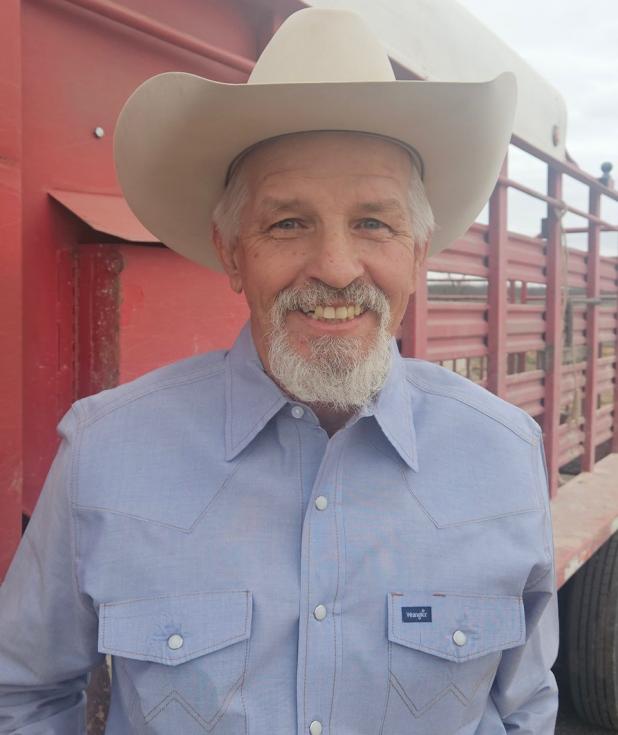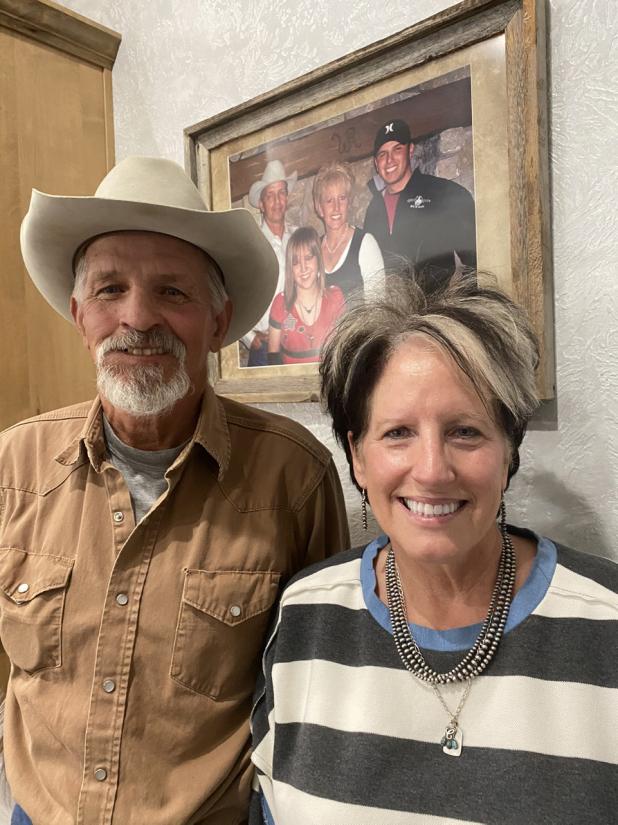

Bobby Wainscott Cowboy
He was born in Olney in 1959. The Wainscott family had been in Olney for 6 generations. He said he always wanted to be just like his dad, Wayne Wainscott. His dad was a true cowboy and worked all trades needed for a ranch. His dad also trained as a boxer and entered competitions in high school, and he later taught Bobby boxing techniques.
Bobby aspired to be a cowboy. It was a long road but he achieved it and always with a big smile that he inherited from his mom, Pat.
Bobby’s dad had an arena near their house where he broke horses. Someone had brought a strawberry roan to be broken. At dark, the lights were turned on in the arena, as this was a second job for Wayne.
Bobby was prepared to help, donning his chaps and spurs. When told he was not included in the event, he had a tantrum and was spanked. He turned the lights off in the arena and received another spanking. He was five or 6 years old.
When Bobby was eight years old, his dad worked as a cow penner every Tuesday at the Olney Livestock Auction sale barn. After school, Bobby would go there and work for his dad. There were 6 helpers. Bobby was one of them. This number would repeat in his life several times. He received his own paycheck.
When Bobby was nine years old, his parents divorced and shared custody of Bobby and his two sisters. With this event, Bobby, his mom, and his sisters moved into the house where his parents lived when he was born. His mom worked as a seamstress to make ends meet while cleaning the house and cooking for her children. Bobby was shown a strong work ethic during those years and taught to respect his elders. He was taken to church by both parents. This meant that Bobby went to First Baptist Church one Sunday and Southside Baptist the next. He said a Sunday school teacher commented to the class that all the boys should be as faithful as Bobby was every other Sunday. Bobby explained that he had two families. Sometime later, Bobby’s mom moved her family in with Granny Wolfe, who became a great help in his life.
Bobby washed dishes in the elementary school cafeteria from 6th grade to his junior year in high school. His pay was lunch. Between then and class, he still had time to get into fights between boys.
Bobby now had step-parents. His chore was to bottle-feed his stepfather’s baby calves. He arose at 5 o’clock to get this done before school. This stepfather taught him a lot about newborn calves and also about carpentry work.
When Bobby was in high school, he worked at a gas station from 5 to 10 o’clock at night, 6 days a week. He learned about servicing vehicles.
Bobby got a job sacking groceries at the local Piggly Wiggly store after school. Bobby began dating a classmate whose father was the owner of the local auto store. Bobby left Piggly Wiggly to work for him after school and on Saturdays, learning a great deal about parts for vehicles.
During this time his parents each remarried. He remembers his dad taking him to the Newcastle bank to borrow $225 to buy a 1955 Ford pickup. His dad signed the note. Bobby made the payments and paid for the gas, maintenance, and insurance. Bobby continued to work at the auto store and lived with his dad during his senior year of high school.
He graduated in 1978. That summer he worked at Coachman Industries. Then he and a friend moved to Lubbock, leasing an apartment understanding there were jobs to be had. His friend was hired but Bobby was not. He was out of work for a month. He spent some time working on the apartment and even making some furniture while looking for a job. With help from a friend in Newcastle, he was hired by Tejas Cattle Feeders, which was a preconditioned feedlot. He put out hay for 5,000 head of cattle with the help of a high school boy. He was one of 18 employees.
Bobby was soon driving a Bobcat used to remove the calves that died in the lot. These were yearlings just taken from their mothers and were in trauma from the separation. Bobby called them “crybabies.” There was a cow doctor on hand to try to help save these calves. They were nurtured, had temperatures checked, given medication, and were encouraged to eat.
Bobby learned and became something of a cow doctor, learning to perform autopsies. He also built wooden feed bunks for this company.
His boss needed the vehicles maintained and saw that Bobby, on his own, had changed oil in a truck. After that, Bobby saw to all the vehicles. He could also change the bushings. He had learned a great deal about vehicles from working in a gas station and an auto parts store.
In the spring, the boss reduced hours to cut the 18-person personnel. Bobby made the cut. He was one of 6 who kept their job.
Bobby heard from a friend that Permian Corporation was hiring for their auto parts department. He was hired and lived in Midland for seven months.
Bobby had been able to run a few head of cattle along with his Granny Wolfe’s cattle on family land. Granny had a longtime manager.
Hearing from an aunt, Janita Lee, that Opex in Olney was hiring, he applied and got a job. It was 1982 and he moved back home to Olney. He became the lonely Maytag repairman. There were 18 employees at that time.
In 1982, a good friend from Newcastle set him up with a blind date. Bobby was reluctant as this friend had arranged other dates that had not been satisfactory but he agreed and decided he would take her to the boxing tournament in Wichita Falls where he was coaching. It turned out to be Carol Lance, his future wife. Carol grew up in Quanah, Texas, and was in college at Midwestern State, working on her degree in education.
The date was difficult but she did later agree to another date. Bobby took her to dinner. On the third date, he took her dancing. This is when all things changed. They began dating and did so for two-and-a-half years. They married in 1985 after Carol graduated and had a teaching job in Megargel. They have continued to go dancing throughout their marriage, even taking square dancing lessons.
Bobby worked at Opex for seven years and he greatly admired his boss, Herb Petty. Bobby was one of 6 of the last employees remaining before Opex closed.
Bobby was now ready to go forward with his chosen profession - a cowboy. His brother-inlaw, Denis Jeske, had a lease agreement and offered the pastureland to Bobby, keeping the farmland for himself. And so Bobby now had 69 acres of leased land to raise cattle along with the cattle on his Granny’s place.
The cattle industry is a very important part of agriculture, supporting local and national economies. The average lifespan of a cow is 20-25 years while her calves enter the feedlot at around 12 months, being slaughtered and sold for food. This is called and cowand- calf operation and requires constant attention from the ranchers.
Lean beef is the most popular protein in America. One of the preferred breeds for consumption is Angus, black and red, and Bobby raises black Angus. He is a member of the American Angus Association.
He learned a lot from a cattle buyer and can spot “a number one Okie.”
The nominee for our nation’s new agriculture secretary, who is from Glen Rose, Texas – Brooke Rollins – aims to strengthen rural America where our food is grown. Olney is rural America.
Bobby’s new stepfather was managing cattle on 1,500 acres for a family from the Metroplex and also 500 acres for a family in Holliday. Bobby worked for him when he could and put in his stepfather’s wheat crop when he became ill.
And so Bobby was working at Opex, running cattle, and coaching boxing for 10- to 12-yearold boys. Bobby had been in a boxing club, gaining knowledge about the sport and becoming more comfortable coaching boys.
Bobby’s stepfather passed away and the owners of the land that he had managed hired Bobby. Bobby and Carol were reluctant for him to quit the job at Opex.
Bobby wrote Carol a letter saying that his work history showed that he always ended up being one of 6 employees who survived any cuts. He was confident in this venture, feeling he could work for himself.
Bobby now was looking after cattle on 3,200 acres and tending his own cattle plus Granny Wolf ’s cattle. Bobby ran for Young County Precinct 3 Commissioner in 2008 and did not get past the primary but gained huge respect for his cousin, Ken Andrew, who backed him in his political foray and later became his cattle partner.
Bobby is now looking after cattle on 5,000 acres. Bobby and Carol welcomed their beautiful and beloved children to the family, a son, Lance, and a daughter, Wendi. They both live in the Metroplex, living their dreams, much as their parents have done.
Bobby and Carol worked and planned to achieve their dreams. Bobby said he had good parents. His partnerships in the cattle business have been good and his partnership with Carol has been the best. Carol said Bobby always assured her by having a backup plan.
Carol retired from Olney Independent School District after 28 years of teaching. Carol’s jobs have greatly supported the family income. She now has a job with Four Sixes (6666) Ranch in Guthrie, Texas.
Bobby and Carol were able to purchase the original 69 acres Bobby started with and then purchased the land from the family from the Metroplex. They named their ranch “Twin Valley Ranch,” as two creeks meet on this land. Bobby’s brand is a rounded ‘W’ that intertwines in the middle. They owned the land for 17 years, only recently selling it.
Bobby and Carol achieved their goal and have just moved into their lovely new home, thanks to Cliff, Brian, and Kim. On the original 69 acres that Bobby acquired by a handshake from this brother-in-law, Bobby calls it Carol’s house by design. The house is positioned by Bobby’s design so that the sunshine comes in just where Bobby wants it. An array of spurs on the fireplace hearth is waiting for Carol’s design to display them. A technique called “heavy drag,” made by a brush or tool dragged through wet glaze to create a pattern, is on the walls by Bobby’s design. But the most important thing is a family photograph displayed in a prominent place on the wall of the family room.
Bobby told Carol that they should do the hard work when they were young so that one day it would be easier and it certainly is that for them now.
Bobby still runs cattle on the original 69 acres where the house is located. He looks after cattle on 5,500 acres with one employee.
Carol has learned to give shots, always apologizing to each cow.
Bobby and Carol have a Quarter Horse business and are lifetime members of the American Quarter Horse Association. The horses are broken, trained, and sold.
Some years ago, Bobby designed, put together, and patented a horse and cattle feeder trailer.
On a cold night recently, an Angus calf was born. Bobby was on site. He is a cowboy in rural America - Olney. It’s a great place to live, raise a family, and thrive in business.
